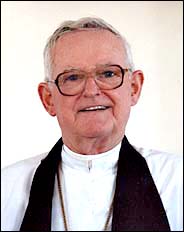Dorothy – 23/7/99
“A life of unbelievable privilege” –
A three part interview with the Very Rev Dr Alan Brash
|
|
| The Very Reverend Alan Brash |
To focus on the life of New Zealander Alan Brash is to see the Christian church worldwide
moving towards ecumenism, early moves towards pacifism in the church in New
Zealand, and an increasing number of New Zealanders gradually seeing their
nation as part of Asia, not merely as a distant appendage of Great Britain.
Part 1 1913 – 1957 Alan began this interview by saying that his has been “‘a life of unbelievable privilege”.
His whole life has been much influenced by his family background in that it
was ex-Scotland, early settler, strongly Presbyterian and strongly church
oriented. All that was taken for granted in his family life.
The early story of the Brash family is told in “The Road from Saddle Hill”,
by F. O. Bennett – a gripping tale of a pioneer family struggling to survive in Otago from 1858.
Alan grew up in Miramar in Wellington in the life of a suburban congregation which was very fortunate in having the services of two quite
outstanding ministers during Alan’s youth – the Rev. James Gibb and Dr John
Allan. It was their influence which taught Alan how to understand the Bible, how to preach from it, and how to withstand the hatred and hysteria
that was leading to World War II which was going to kill fifty seven million people.
Alan describes himself as a scholar who did not distinguish himself at school or at Otago University although he gained a Masters degree there
with Honours in Philosophy. It was only when he went to Scotland to study
theology at New College, Edinburgh, that he began to gain top marks for his
work. Typically he attributes this success to the quality of his teachers.
He graduated with high honours and was licensed in the Chapel of the Thistle in St Giles’ Cathedral.
First contact with world ecumenism In his third year in Edinburgh two world conferences of the church took
place in Britain – a Faith and Order Conference in Edinburgh and a Life and
Work Conference in Oxford. Alan was made a New Zealand delegate because he
was on the spot and the church could not afford to send a second delegate.
It was at these meetings in 1937 that the idea of a World Council was agreed to. He recalls how moved he was by the courage of the German delegates who in spite of Hitler banning their attendance had come to warn
people about the reality of Nazism.
His future wife, Eljean Hill, was able to attend the Conference as an observer. Both Alan and Eljean became involved in a vision of world ecumenism – of a world wide church – and that vision shaped the rest of
their lives.
First contact with desperate poverty Before leaving Britain Alan was sent as assistant to a minister in a poverty-stricken and near slum area in Edinburgh – an experience that has
strongly influenced him ever since.
Back in New Zealand Alan returned to New Zealand to become a parish minister in Wanganui nine
months before the outbreak of World War II. Here he enountered another
aspect of human suffering as some seventy men from the parish went away in
the armed forces. He felt deep concern for these men and their families
and prayed for them and also for those they fought against. He made his
views known to the congregation, many of whom disagreed with him. A few
left, but most agreed to differ and the congregation grew.
Alan enjoyed the involvement with the people. At his induction the Rev
John Hubbard said that Alan had been through the best theological training
that the world could give him, but it was up to his first congregation to
make him a minister – and they did.
While he was in Wanganui he married Eljean, and they had two children, a
son Donald and a daughter Lynette. They also adopted an orphan boy from
Edinburgh when the orphanage was closed by the war. For a year they housed
a refugee whose whole family died in Hitler’s gas chambers.
A voice defending the disadvantaged >From the beginning Alan was active in the Assemblies of the Presbyterian
church. The first issue was the salary of Home Missionaries. These people were not fully trained ministers and were put into difficult, often
remote, parishes and were paid a pittance. Alan advocated that ordained
ministers should not receive an increase in their stipend until Home Missionaries had received a similar increase. It took a few years, but
eventually justice was done.
A voice for peace At assemblies during the war Alan pleaded for the church to work for peace.
After the war the Government decided to deprive the six hundred conscientious objectors who had been in the camps of their civil rights for
ten years. This meant that they had no vote in the next election. Now that
the war was over Alan pleaded with the Assembly to go to the Government and
protest over this action. Only two people in the Assembly supported him –
the Rev. Malcolm Wilson of Knox Church, Christchurch, and Alan’s father T.
C. Brash who had been the second Lay Moderator of the Presbyterian Church
in New Zealand in 1944.
Invitation to teach theology in China In 1947 Alan was invited to teach theology in the Lingnan University in
Canton. He finally agreed to go and then the University said that they
wanted someone to teach Old Testament. He did not believe that he could
cope with teaching Hebrew in Chinese so decided not to accept the position.
Though invited back to his parish, he felt that after eight years there it
was time to move on.
The New Zealand National Council of Churches (NCC) founded In the meantime the proposal of 1937 to form a World Council was having its
impact locally, and in Christchurch there was an inter-church movement which led to the formation of the National Council of Churches. There are
now over eighty countries to have such ecumenical bodies, but New Zealand
was one of the first.
Alan appointed as full-time secretary to the NCC The NCC had been functioning for a few years, but had lost its first full-time secretary. Alan was delighted to be appointed as his successor.
The NCC was strong, but financially weak. At first the office consisted of
Alan and one secretary. The people who made up the Council were in Alan’s
words “far too male and far too clerical”, but they were power people in
their own denominations, which increased the influence of the NCC’s decisions. They launched the Christmas Appeal for overseas aid, and held
national church conferences on theology and the life and work of the church
es. After one of these conferences the NCC formed an interdenominational
Maori Council.
Change lay ahead. Eventually the Council had to be more inclusive of lay
people, including women, and in the years when the churches have mostly
been declining in strength they have been unable or unwilling to be so active ecumenically.
Alan served as the Council Secretary from 1947 to 1952, and then accepted
a call to St Giles parish in Christchurch. In 1956 he returned to the NCC.
Read Part 2 of this interview, describing Alan Brash’s involvement in the work of the Church internationally.




